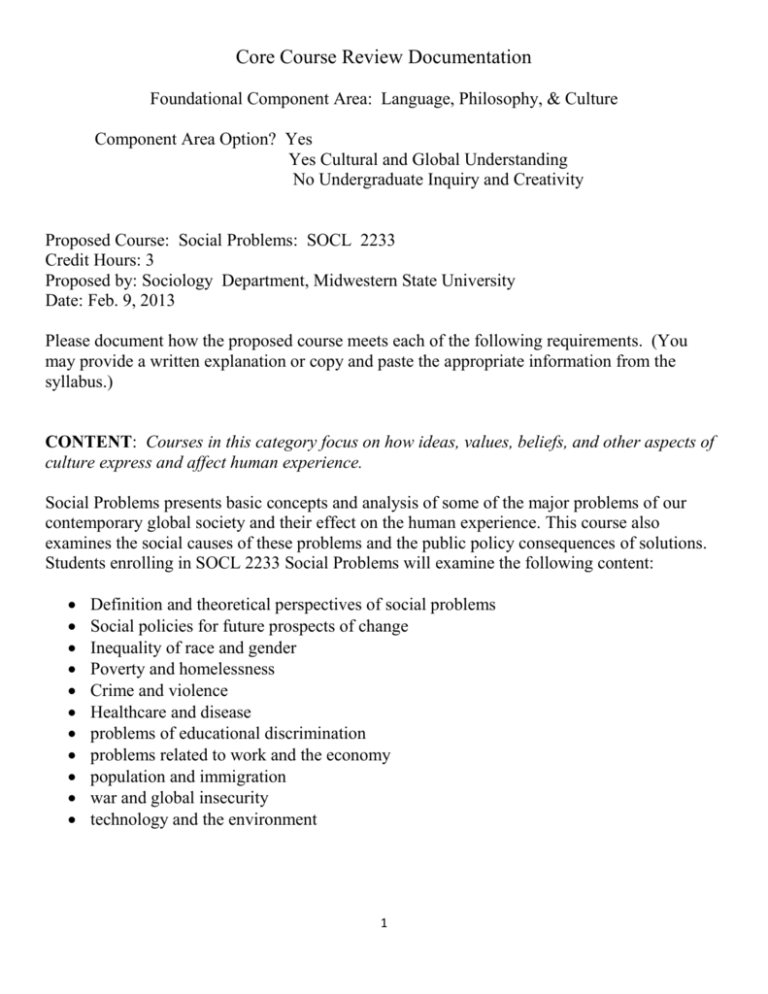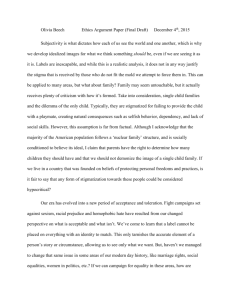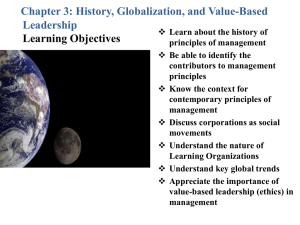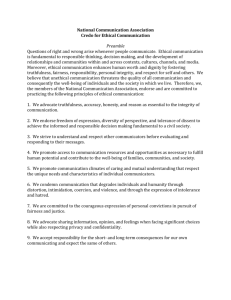Social Problems - Midwestern State University
advertisement

Core Course Review Documentation Foundational Component Area: Language, Philosophy, & Culture Component Area Option? Yes Yes Cultural and Global Understanding No Undergraduate Inquiry and Creativity Proposed Course: Social Problems: SOCL 2233 Credit Hours: 3 Proposed by: Sociology Department, Midwestern State University Date: Feb. 9, 2013 Please document how the proposed course meets each of the following requirements. (You may provide a written explanation or copy and paste the appropriate information from the syllabus.) CONTENT: Courses in this category focus on how ideas, values, beliefs, and other aspects of culture express and affect human experience. Social Problems presents basic concepts and analysis of some of the major problems of our contemporary global society and their effect on the human experience. This course also examines the social causes of these problems and the public policy consequences of solutions. Students enrolling in SOCL 2233 Social Problems will examine the following content: Definition and theoretical perspectives of social problems Social policies for future prospects of change Inequality of race and gender Poverty and homelessness Crime and violence Healthcare and disease problems of educational discrimination problems related to work and the economy population and immigration war and global insecurity technology and the environment 1 SKILLS: Courses involve the exploration of ideas that foster aesthetic and intellectual creation in order to understand the human condition across cultures. Students enrolling in SOCL 2233 Social Problems develop the following skills: Students will display effective communication skills. Students will critically evaluate the appropriateness of rival explanations of current social problems and the implications for a world community. Students will demonstrate an understanding of the importance of ethical decision making and participation in a global marketplace filled with graft and exploitation. Students will demonstrate an understanding of their role as global citizens in exploring equity, peace, human rights, and sustainability in a global community. Throughout Social Problems students will engage in a series of learning activities designed to foster communication skills, critical thinking, and personal and social responsibility. These activities include classroom discussions that are focused on contemporary social problems both in the U.S. and in other cultures worldwide. During these discussions students will be required to critically evaluate the major trends and future outlook for each social problem by looking at them from a Global perspective. Students will evaluate social problems from the predominant theoretical perspectives of each social problem. These discussions will support the development of student oral communication skills as well as to help develop an appreciation of their place in a larger global world. This will include an appreciation of ethical decision making, social policy, and human rights discussions. These discussions will take place daily in conjunction with the content delivery of the course, often through films, articles, or campus speakers. In addition to classroom discussions, students will be required to complete a series of writing assignments designed to further develop critical thinking and written communication skills while fostering both personal and social responsibility. These learning activities will occur regularly throughout the semester. In addition to these regular learning activities, students will be required to complete a final writing project. This final writing project will be used to assess student progress towards these four learning objectives: critical thinking skills, communication skills, personal responsibility, and social responsibility. ASSESSMENT OF CORE OBJECTIVES: Assessments should be authentic, intentional and direct. The following four Core Objectives must be addressed in each course approved to fulfill this category requirement: Assessment of the four core objectives will be conducted in a final writing assignment that requires students to develop a coherent argument that addresses a contemporary social problem. 2 In the final writing assignment, students will be required to research a particular social problem, critically evaluate theoretical explanations of the particular social problem, the ethical and human rights dimensions of the social problem, as well as make a comparison of the dimensions of the social problem as it exists in the United States with another country of their choice. Their argument and comparison must be presented in a 5-7 page double spaced written essay. Example of Final Writing Project: Final Project: Changing Gender Relations and Expectations We cover consequences of prejudice and discrimination in many areas within sociology, including the areas of sexism and gender inequality. This is a topic of global concern. Gender relations and expectations are changing around the world. Gains have been made in gender equality in the last two decades. Still, nowhere in the world do women experience full parity in society, work, and government with men. Around the world, people are marrying later and divorcing more often. The changes in the last half of the twentieth century were most dramatic in the United States, but parallel changes took place first in Europe and somewhat later in Latin America and Asia. The economic consequences place more women, than men, at risk for poverty. Changes in work and marriage have also complicated the task of parenting, sometimes making relationships between spouses and between parents and children more contentious. Women still earn less than men, on average, around the world. Women are particularly at risk for trafficking, exploitation, and sexual violence. These risks are greatest in conflict zones but have also become part of a global pattern. After reading the course material on the topic of sexism and gender, viewing films, and discussing the topic in class, you should develop a position on the topic of changing gender relations and expectations, in answer to the following questions Issues to be addressed include the following: 1. What are particular challenges and dangers faced by women in the world, and in the country you have chosen in particular to compare and contrast with the United States? 2. Are global changes making for stronger, happier, and more equal families and marriages or are they undermining the traditional strength of marriages and families? What are the losses and gains as it pertains to the United States and to the country you have chosen to analyze? 3. What theoretical perspective do you find most valuable in explaining women’s place and the changes that are occurring? 4. What must be done to make the world a safer, more equitable place for women and children in the future? What social policies hold out the most hope for future prospects for equitability for women and children? 3 Each essay must be supported by evidence from the text, academic articles, and from such valid sites as “The United Nations Population Fund,” “United Nations Economic and Social Council,” “The Millennium Goals,” or a website titled “Half the Sky” (halftheskymovement.org) in which organizations are listed that are working to empower women and girls. Organizations are centered around education, maternal health, economic empowerment, combating sexual violence, and more. Critical Thinking Skills – to include creative thinking, innovation, inquiry, and analysis, evaluation and synthesis of information. During the final writing assignment, students will be required to explore a contemporary social problem and critically evaluate competing theories of explanation for it. Students’ ability to achieve this learning objective will be assessed with the critical thinking rubric attached below. This was adapted from the Association of American Colleges and Universities templates. Communication Skills – to include effective development, interpretation and expression of ideas through written, oral, and visual communication. During the final writing assignment, students will be required to develop an academic argument in response to the essay prompt. Students will then present this argument in a 5-7 page double spaced written essay. The written communication rubric attached below will be used to assess the student’s progress towards the core learning objective of oral communication skills. Personal Responsibility – to include the ability to connect choices, actions and consequences to ethical decision-making During the final writing assignment, students will be required to ethically evaluate the inequalities produced and their support for a quest for social justice. Progress towards the development of personal responsibility will be assessed with the attached personal responsibility rubric. Social Responsibility – to include intercultural competence, knowledge of civic responsibility, and the ability to engage effectively in regional, national, and global communities. During the final writing assignment, students will be required to examine the consequences of inequalities in the United States as well as globally. The quest for social justice, a sense of basic fairness for all, will be a common theme throughout the course. Student progress towards the development of social responsibility will be assessed with the attached social responsibility rubric. ADDITIONAL INFORMATION: Provide any additional information supporting course inclusion in the core (optional). PLEASE ATTACH THE FOLLOWING 4 SYLLABUS Course Description: Social Problems presents basic concepts and analysis of some of the major problems of contemporary society, in the United States as well as globally. Of interest are the social causes of these problems and the public policy consequences of solutions. The quest for social justice, a sense of basic fairness for all, will be a common theme throughout the course. Topics addressed will include inequality of race and gender, poverty and homelessness, crime and violence, healthcare and disease, problems of educational discrimination, problems related to work and the economy, population and immigration, war and global insecurity, technology and the environment. This course is writing intensive. There will be three paper assignments. Two papers will be 2-4 pages in length and will be reaction papers to one of the topics as presented in a film, a chapter from the text, through additional articles on reserve in the library, or through presentation from a campus speaker or lecturer. Students will have to analyze the film, chapter, article, or the campus speaker’s presentation in terms of the theoretical perspective presented and how the explanation or argument either supports, or does not support, what the text has to say about the topic, thus showing the student can evaluate evidence provided. They will also provide input on their position of the issue, an evidence-based position is necessary. The third paper will be a 5-7 page paper, due at the end of the semester in which the student will have to critically evaluate competing theories of explanation for the social problem they have chosen to examine. They will be required to develop a more in-depth, comprehensive, examination of the social problem both from the United States and globally, providing complete evidence and a synthesis that is logical and reveals a sense of personal and social responsibility for understanding how and why to work to solve our global social problems. Texas Core Objectives: This course will support the development of the following state mandated core learning objectives: Critical Thinking, Communication Skills, Personal Responsibility, and Social Responsibility. Texts: Kornblum, William, and Joseph Julian.Social Problems, 2011. Social Problems. (14th Edition), Pearson. Sernau, Scott. 2012. Global Problems: The Search for Equity, Peace, and Sustainability. (3 rd Edition). Pearson. Additional Readings available on D2L. 5 Expectations, Examinations, and Grading: I wish to provide an open learning environment. I also wish to foster social and intellectual maturity through individual struggle with unfamiliar ideas. We must recognize that our views and convictions may be challenged, but we should expect this challenge to take place in a climate of tolerance and mutual respect. You will find a high correlation between attendance and class grade. In-class exercises and pop quizzes are part of your grade. Therefore, good attendance is a necessity. If you have more than 3 unexcused absences, you will be dropped from this class with an F. 1. QUIZZES /ASSIGNMENTS: I will give quizzes or in-class assignments worth a quiz grade throughout the semester worth 10 points each. I’ll most likely give 11 or 12 and will drop the lowest one (or two if I’ve given 12). This will result in another grade worth 100 points. You will not be permitted to make-up missed quizzes.. This is why I will give “at least” one extra quiz (and maybe two) so that you can miss at least one without being penalized. The quizzes not only help to prepare you for the exams, but they also serve as an enticement to come to class 2. There will be 3 exams. (each worth 100 points). These exams will be comprised of both multiple choice and essay. 3. There will be 3 writing assignments. As previously discussed, two of these papers will consist of reaction papers and the third will be a final term paper. . The following is the basis for your grade: quiz grades Exams (3) Reaction Paper 1: Reaction Paper 2: Paper 3(final paper): TOTAL 100 points 300 points 25 points 25 points 50 points 500 (divide by 5 for grade) Grades will be determined by the following scale: A = 90-100 B = 80-89 C = 70-79 D = 60-69 F = below 60 6 COURSE OUTLINE TOPIC Definition and Theoretical Perspectives on Social Problems as well as social policies for future perspectives of change Inequalities of race and gender Poverty and homelessness Crime and Violence EXAM #1 Education and Discrimination Healthcare and Disease Population and Immigration EXAM #2 Work and the economy War and global insecurity Technology and the Environment TEXT CHAPTER 1 (Kornblum) 7 and 8 (Kornblum) 6 (Kornblum) 5 (Kornblum) 4 (Sernau) 2 and 3(Kornblum) 9 and 10 (Sernau) 2 (Sernau) 6 (Sernau) 11 and 12 (Sernau) FINAL EXAM ASSESSMENT FOR CRITICAL THINKING SKILLS Undergraduate-Level Critical Thinking Rubric 7 Critical Thinking, undergraduate-level work in Sociology will be evaluated through the assessment of a writing assignment in the areas of explanation of argument, evidence, student’s position, and conclusions. A summary chart is provided to explain how work will be assessed. Skill Explanation of Argument Evidence Student’s Position Conclusions Excellent Good Satisfactory Unsatisfactory Poor Explanation of Argument: Does the student clearly state the contemporary social problem examined: Does the student comprehensively describe the contemporary issue examined? Does the student deliver the relevant information necessary for a full understanding of a contemporary social problem? Evidence: Does the student use authoritative sources? Does the evidence employed enable the student to develop a comprehensive analysis of a social problem? Does the student thoroughly evaluate the viewpoints/positions of the authoritative sources? Student’s Position: Does the student’s position take into account the complexity of the contemporary social problem? Does the student acknowledge the limits of their position? Does the student synthesize other’s points of view within their position? Conclusions: Are the student’s conclusions logical? Do the student’s conclusions reflect an informed evaluation? Do the student’s conclusions demonstrate an ability to place evidence and perspectives in priority order? 8 ASSESSMENT FOR COMMUNICATION SKILLS Undergraduate-Level Term Paper Rubric Written, undergraduate-level work in Sociology will be evaluated through the assessment of papers in the areas of argumentation and analysis, evidence and documentation, structure and style, and grammar and mechanics. A summary chart is provided to explain how work will assessed. In addition, the areas of evaluation used are outlined below. Skill Excellent Argumentation and Analysis Evidence and Documentation Structure and Style Grammar and Mechanics Good Satisfactory Unsatisfactory Poor Argument and Analysis: Does the paper contain a clear thesis statement or research question? Does the paper have a clear hypothesis and argument, appropriate for college-level work? Does the main argument of the paper match or answer the research question or thesis statement? Are the main argument and key points clear? Does the paper clearly address the research questions and hypothesis or thesis statement throughout? Does the paper develop its main points well? Does the paper address other research in the field to place its argument in conversation with other work? Does the paper address counterarguments and possible limitations of the research presented in the paper? Evidence and Documentation: To what extent does the paper support its claims? What types of support are utilized and are they appropriate for college-level work? Are source materials clearly documented in accordance with citation guidelines given in the course or in college-level writing courses at Midwestern State University? Is there analysis of the sources or is evidence used too descriptively? Does the evidence offered in the paper help to further the overall argument? 9 Structure and Style: Is the paper clearly organized? Does the paper include required elements of the assignment? Is the style of the paper appropriate for a college-level in Sociology? Is the tone of the paper appropriate for a college-level course in Sociology? Grammar and Mechanics: Does the paper employ appropriate grammar? Does the paper make use of punctuation and mechanics? 10 ASSESSMENT FOR PERSONAL RESPONSIBILITY Undergraduate-Level Personal Responsibility Rubric Personal Responsibility (to include the ability to connect choices, actions and consequences to ethical decision-making) undergraduate-level work in Sociology will be evaluated through the assessment of written assignments in the areas of ethical self- awareness, understanding different ethical perspectives, ethical issue recognition and application of ethical perspectives. A summary chart is provided to explain how work will be assessed. In addition, the areas of evaluation used are outlined below. Skill Excellent Ethical SelfAwareness Understanding Different Ethical Perspectives Ethical Issue Recognition Application of Ethical Perspectives Good Satisfactory Unsatisfactory Poor Ethical Self-Awareness: Did the student discuss core ethical beliefs? Did the student discuss the origins of core ethical beliefs? Did the student connect core ethical beliefs with the origins of core ethical beliefs when examining a contemporary social problem? Understanding Different Ethical Perspectives: Did the student identify sociological theories relevant to the contemporary social problem? Did the student accurately apply sociological theories to a contemporary social problem? Did the student accurately identify and apply sociological theory to a contemporary social problem? Ethical Issue Recognition: Did the student recognize an ethical issue when presented with a complex social problem? Did the student recognize cross relationships among multiple social problems? 11 Did the student identify an ethical issue and link this issue with broader sociological implications? Application of Ethical Perspectives: Did the student independently apply ethical principles to contemporary social problems? Did the student correctly apply ethical principles to a contemporary social problem? Did the student consider the full implications of the application of ethical principles to a contemporary social problem? 12 ASSESSMENT FOR SOCIAL RESPONSIBILITY Undergraduate-Level Social Responsibility Rubric Social Responsibility (to include cultural competence, knowledge of civic responsibility and the ability to engage effectively in regional, national, and global communities) undergraduate-level work in Sociology will be evaluated through the assessment of written assignments in the areas of diversity of social problems in various communities and cultures, ethical issue recognition, application of ethical perspectives, and support for social justice. A summary chart is provided to explain how work will be assessed. In addition, the areas of evaluation used are outlined below: Skill Excellent Diversity of Communities and Cultures Analysis of knowledge Social Justice Identity Social Justice Context Good Satisfactory Unsatisfactory Poor Ethical Issue Recognition: Did the student demonstrate an adjustment in their attitudes and beliefs based on learning from diversity of communities and cultures? Did the student promote others engagement with diversity? Did the student demonstrate adjustments in their own attitudes and promote engagement with diversity based on their learning from the diversity of communities and cultures? Analysis of Knowledge: Did the student connect sociological theory to a commitment to social justice perspectives and engagement? Did the student connect sociological theory to their own participation in efforts to support social justice? Did the student display an understanding of the connection between social justice and contemporary social policy? Social Justice Identity: Did the student identify lessons learned from the assignment? Did the assignment shape the student’s social justice identity? Did the assignment strengthen the student’s commitment to social justice? 13 Social Justice Context: Did the student demonstrate an ability to identify a social justice aim for U.S. society or that of another? Did the student demonstrate a need for work to be done within a community context to achieve a social justice aim? Did the student identify a social justice aim and demonstrate a commitment to work within a social justice context to achieve this aim? 14







